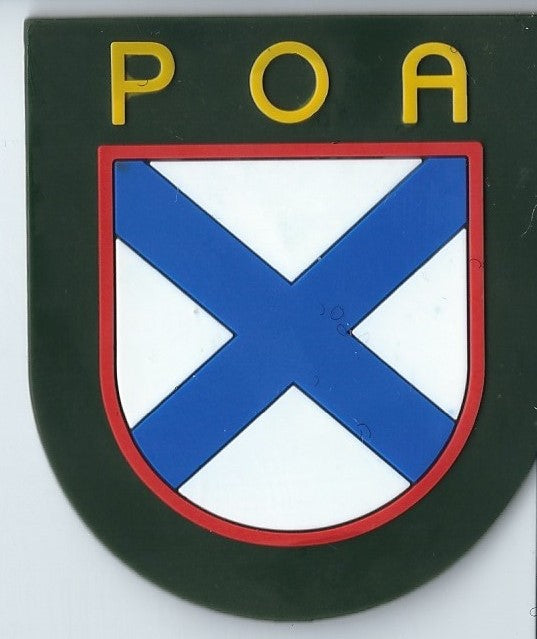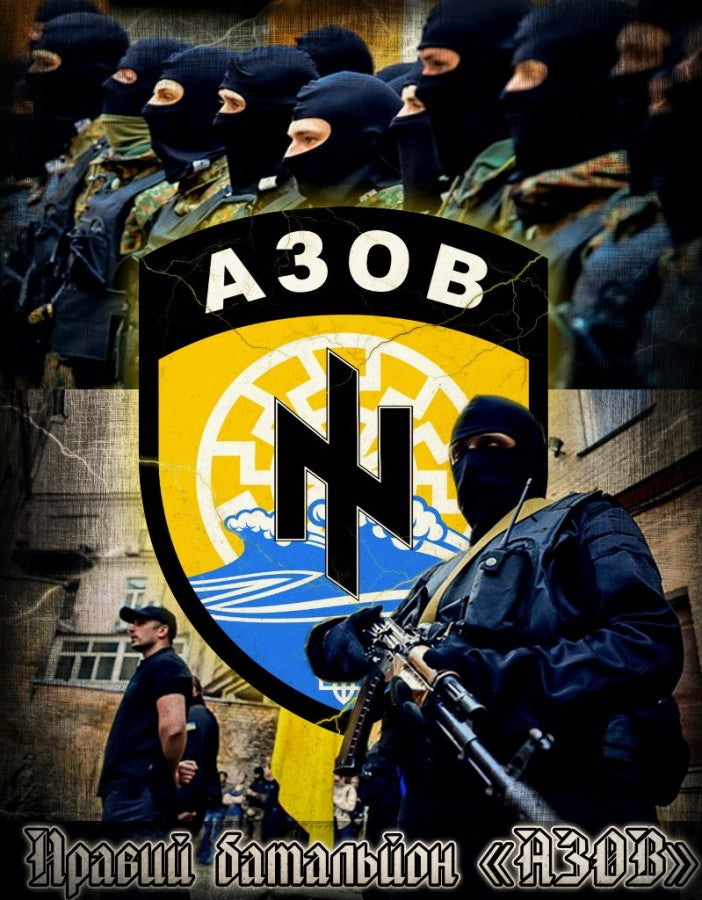buypatch.net
PIN Russian Liberation Army RUSSIAN VOLUNTEER Corps Русский добровольческий корпус
PIN Russian Liberation Army RUSSIAN VOLUNTEER Corps Русский добровольческий корпус
Couldn't load pickup availability
The Russian Liberation Army (German: Russische Befreiungsarmee; Russian: Русская освободительная армия, Russkaya osvoboditel'naya armiya, abbreviated as РОА, ROA, also known as the Vlasov army (Власовская армия, Vlasovskaya armiya)) was a collaborationist formation, primarily composed of Russians, that fought under German command during World War II. The army was led by Andrey Vlasov, a Red Army general who had defected, and members of the army are often referred to as Vlasovtsy (Власовцы). In 1944, it became known as the Armed Forces of the Committee for the Liberation of the Peoples of Russia (Вооружённые силы Комитета освобождения народов России, Vooruzhonnyye sily Komiteta osvobozhdeniya narodov Rossii, abbreviated as ВС КОНР, VS KONR).[1]
Vlasov agreed to collaborate with Nazi Germany after having been captured on the Eastern Front. The soldiers under his command were mostly former Soviet prisoners of war but also included White Russian émigrés, some of whom were veterans of the anti-communist White Army from the Russian Civil War (1917–23). On 14 November 1944, it was officially renamed the Armed Forces of the Committee for the Liberation of the Peoples of Russia, with the KONR being formed as a political body to which the army pledged loyalty. On 28 January 1945, it was officially declared that the Russian divisions no longer form part of the German Army, but would directly be under the command of KONR.
In May 1945, members of the ROA switched sides and joined the anti-Nazi Prague uprising.
Тhe Russian Volunteer Corps (RVC; Russian: Русский добровольческий корпус, РДК, romanized: Russkiy dobrovolcheskiy korpus, RDK) is a paramilitary unit of Russian citizens, based in Ukraine. It was formed in August 2022, during the Russian invasion of Ukraine, to fight against the government of Vladimir Putin.[1][2][3] The group reportedly consists of Russian emigrants who are primarily united by their opposition to Putin.[1] According to Ukrainian military officials, the group is not a part of the Ukrainian armed forces.[1] The group has been described as far-right.[1][3][4][5] Its leader is Denis Kapustin.[6]
The group claimed responsibility for a March 2023 raid into the Bryansk region of Russia. Since May 2023, it has been launching larger cross-border raids into the Belgorod region of Russia, alongside the Freedom of Russia Legion.
Русский добровольческий корпус
The Freedom of Russia Legion[3] (Russian: Легион «Свобода России», romanized: Legion "Svoboda Rossii"; Ukrainian: Легіон «Свобода Росії», romanized: Lehion "Svoboda Rosiyi"), also translated as the Freedom for Russia Legion,[4][5] or the Liberty of Russia Legion[6] is a legion of the Armed Forces of Ukraine, formed in March 2022 to protect Ukraine against the 2022 Russian invasion of Ukraine during the Russo-Ukrainian war. It consists of defectors of the Russian Armed Forces, as well as other Russian and Belarusian volunteers who have not previously been members of military formations.[7][8]
According to the Legion, the unit consists of two battalions.[1] Oleksiy Arestovych said that "dozens participate in conflicts, hundreds at training and up to 4,000 candidates",[9] and that 250 new members joined the Legion in June 2022.[10]
Shipping
Shipping
Share







Azov Collection
The most full collection of Azov patches
The Azov Special Operations Detachment (Ukrainian:
Окремий загін спеціального призначення «Азов», romanized: Okremyi zahin
spetsialnoho pryznachennia "Azov"), also known as the Azov Regiment
(Ukrainian: Полк Азов, romanized: Polk Azov) or Azov Battalion until
September 2014, is a unit of the National Guard of Ukraine based in
Mariupol in the coastal region of the Sea of Azov. Azov formed as a
volunteer paramilitary militia in May 2014, and has since been fighting
Russian forces in the Donbas War. It first saw combat recapturing
Mariupol from Russian forces and pro-Russian separatists in June 2014.
It initially operated as a volunteer police company, until it was
formally incorporated into the National Guard on 11 November 2014. In
the wake of the 2022 Russian invasion of Ukraine, the battalion gained
renewed attention for its use by Russia in justifying the invasion and
during the Siege of Mariupol for its role in the defense of the city.
Subscribe to our emails
Be the first to know about new collections and exclusive offers.





